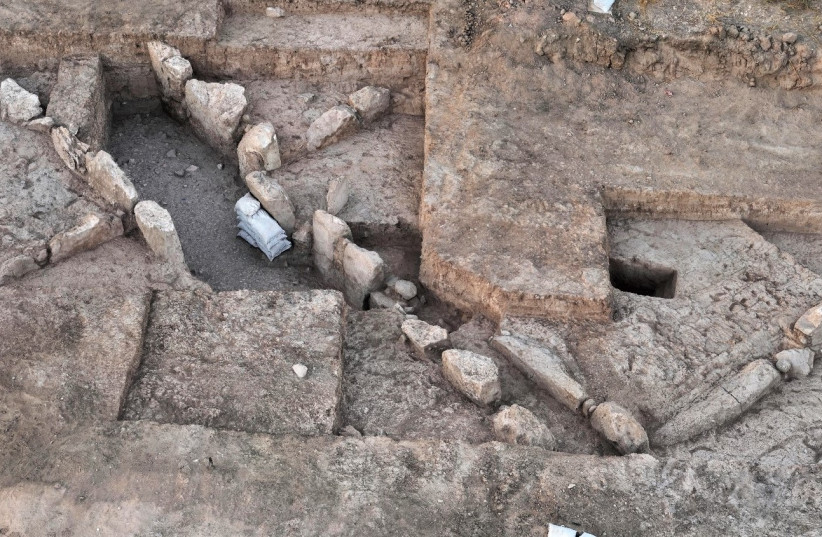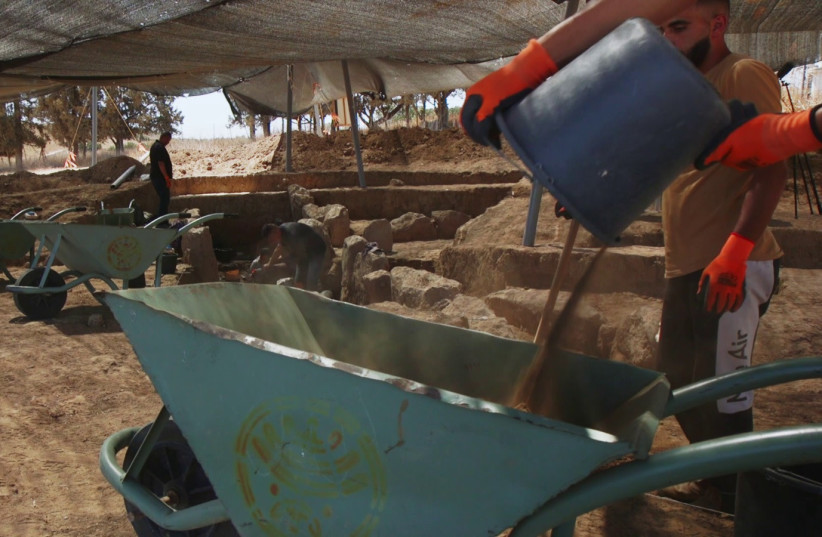A 5,500-year-old city gate was uncovered during excavations carried out near Kiryat Gat in southern Israel, with archaeologists saying this is the most ancient gate ever discovered in Israel.
The gate and part of a fortification system were discovered at Tel Erani ahead of the laying of a water pipe by the Mekorot Water Company which is set to supply water to the Intel factory.
The fortifications date to the early Bronze Age, about 3,300 BCE, reflecting the beginning of urbanization in the Land of Israel and the Southern Levant.
Until the discovery of the gate at Tel Erani, the oldest known gate in Israel was at Tel Arad, which dates to about 300 years later than the newly found gate.
About 1.5 meters of the gate remain intact. The remains include a passageway built of large stones, leading into the ancient city. The gate is flanked by two stone towers, with rows of mudbricks in between. The gate is attached to city walls found in earlier excavations.

After the excavation, the gate was covered up to protect it from erosion. The planned water pipe was moved in order to preserve the gate.
Newly discovered gate serves as evidence of early urbanization
Emily Bischoff, director of the excavation on behalf of the Israel Antiquities Authority explained that “This is the first time that such a large gate dating to the Early Bronze Age has been uncovered. In order to construct the gate and the fortification walls, stones had to be brought from a distance, mudbricks had to be manufactured, and the fortification walls had to be constructed. This was not achieved by one or a few individuals. The fortification system is evidence of social organization that represents the beginning of urbanization.”
Martin-David Pasternak, the Israel Antiquities Authority's researcher for this period, added that “It is probable that all passers-by, traders, or enemies who wanted to enter the city had to pass through this impressive gate. The gate not only defended the settlement, but also conveyed the message that one was entering an important strong settlement that was well-organized politically, socially, and economically. This was the message to outsiders, possibly also to Egypt, where the process that would lead to the unification of the Lower and Upper Egypt under King Narmer was already beginning.”

Pasternak added that, “At the end of the Early Bronze Age, the Egyptians themselves arrived here and settled the tel, and they reused the gate.”
Dr. Yitzhak Paz, an Israel Antiquities Authority archaeologist specializing in the Early Bronze Age period, explained that Tel Erani was an important early urban center in the area during the Early Bronze Age.
"The tel site was part of a large and important settlement system in the southwestern area of the country in this period," added Paz. "Within this system we can identify the first signs of the urbanization process, including settlement planning, social stratification, and public building. The newly uncovered gate is an important discovery that affects the dating of the beginning of the urbanization process in the country."
"The extensive excavations carried out by the Israel Antiquities Authority over recent years have led to dating the beginning of urbanization to the end of the fourth millennium BCE, but the excavations carried out at Tel Erani have now shown that this process began even earlier, in the last third of the fourth millennium BCE."
Eli Escusido, director of the Israel Antiquities Authority, stated that “The discovery of the most ancient city gate known in the country adds another important piece of knowledge to our archaeological knowledge."
Excavations at Tel Erani began in the mid-1950s under the Department of Antiquities, the Israel Antiquities Authority, Ben-Gurion University of the Negev, and the University of Krakow, Poland.
